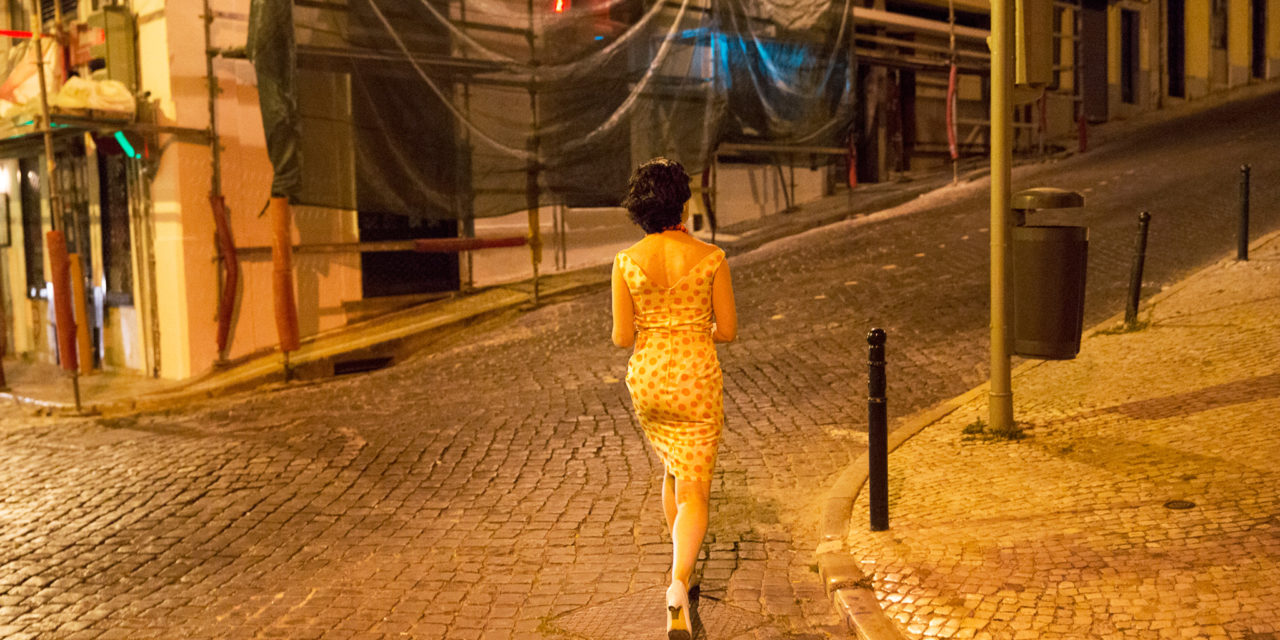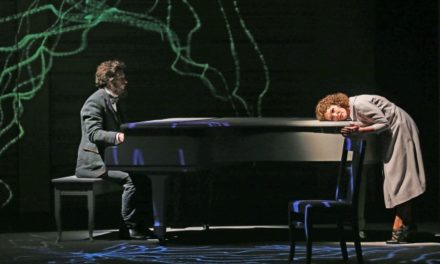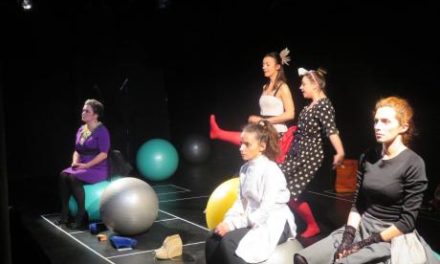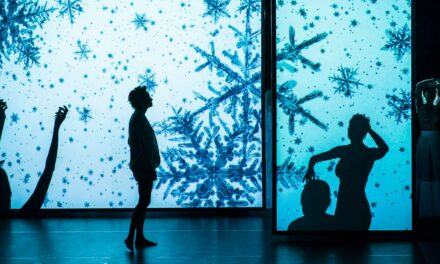After Tiago Rodrigues was appointed Director of Dona Maria National Theatre, in Lisbon, in October 2014, we knew things were bound to change. The award-winning young director of Mundo Perfeito (The Perfect World), now famous worldwide as author and director of such plays as Sadness and Joy in the Life of the Giraffes, Three Fingers Below the Knee, and By Heart, not only brought his own plays into the repertoire of Portuguese National Theatre international tours (the last two were recently presented as part of the Iberian Suite at the Kennedy Center, for example), but also introduced in a short period of time deep changes to the programming and to the role of contemporary theatre makers in it, as well as a series of initiatives redefining the role and position of the Dona Maria National Theatre in Lisbon cultural life.
One of the newly proposed programs is Free Entrance, three days of theatre productions with a free entrance policy. Launched in 2015, the program this year took place 9–11 September with a theatre book fair, book launches and debates, public readings, concerts, outside performances and three new theatre productions by young directors/companies. Ibsen’s Wild Duck, directed by Tiago Guedes; New Creation by Ágata Pinho, a production from the the Newborn Series (a start-up program devised to enhance emerging directors’ work); and This is my city and I want to live in it, by Joana Craveiro / Teatro do Vestido. I want here to talk a bit about this most extraordinary theatre project.
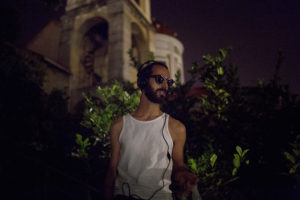
This is my city and I want to live in it by Joana Craveiro / Teatro do Vestido. Photo Credit Filipe Ferreira.
Joana Craveiro and Teatro do Vestido have earned a strong presence in contemporary Portuguese theatre through a series of deeply poetic and political works dealing with collective memories, the recent history of the revolution, and a(n auto)biographic devised dramaturgy, giving audiences a strong sense of a faithful and emotive leap into history, with a little help from the players. This is my city and I want to live in it responds to a challenge: to guide audiences into an experience of the city through a critical and emotional path. Seven short stories are set in the core part of the city, all around the Dona Maria National Theatre (being the farthest point of the old Parque Mayer, the revista theaters facilities).
Each story goes like a meeting with a character as a witness, ensuring a journey through time, a leap into history, a merge into the archive of the place, a confrontation with an insider of the ongoing changes that Lisbon is being subject to: gentrification, the loss of places and cultural references (such as the old cinemas of the city, now hotels, or coffee shops), the erasure of the voices of the dead upon which the city was built, says one character. Small groups of people are, thus, driven through the city to these meetings, finding an old star from the Portuguese revista, the girl who was to become a geographer in her youth memories, the guy who could drive us to the memories of the Ritz (an old club) and to the house of Sofia, a single mother in the neighborhood, and the airbnb, the plague of our times. There was also the woman with an orange dress, the interpreter of the old town and its borders, the archaeologist of the traditional commerce, with memories of the times they are a-changing. And the young man looking for the not-yet-changed, not-yet-taken parts of the city, who found this nook, free of taxes where he mounts his tent.
Two more characters complete the tour, one driven by a cinematic memoire that turns every city into this city (a well-saturated discourse of cinema memories, reminding us of the role of cinema in building (also) real memories) and the poetics of an angel, commenting on the city ruins as distant and engaged as an angel from Wender’s Wings of Desire. The final meeting is at Dona Maria National Theatre’s Great Hall, where the whole team meets the audience for a final perspective on the city. If there were invention and fake elements, as much as real tensions and real characters upon which stories were created, that’s because Teatro do Vestido wants not only to share the city as it is but to drive us into the desire of taking it to ourselves. So, in the end, people step up into the map and the city renews in the urge of the applause.
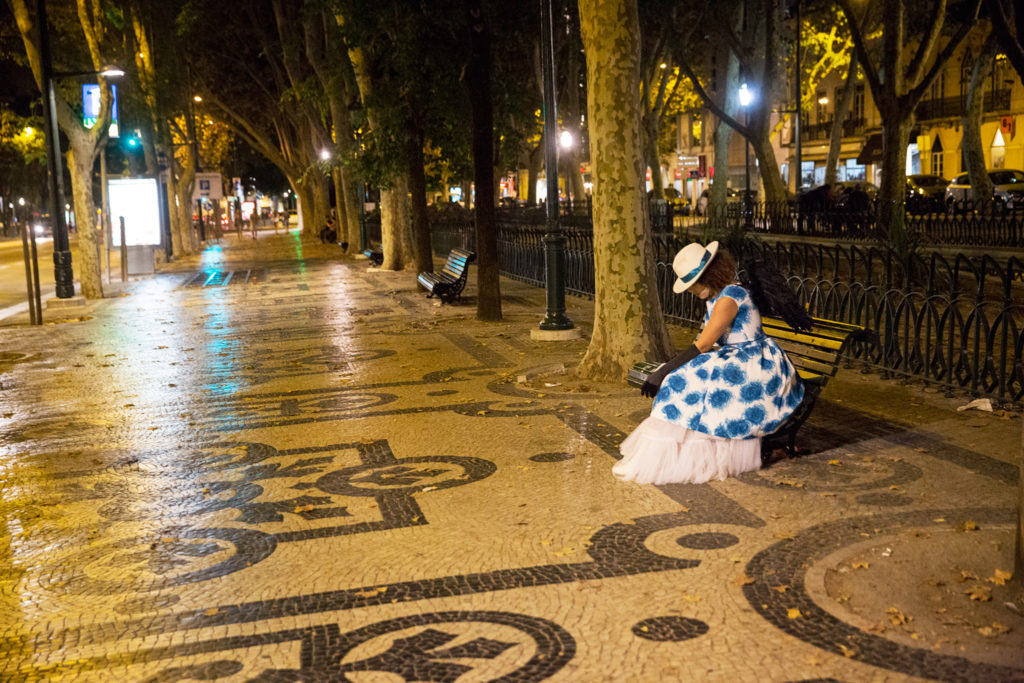
This is my city and I want to live in it by Joana Craveiro / Teatro do Vestido. Photo Credit Filipe Ferreira.
Teatro do Vestido: This is my city and I want to live in it
9 to 24 September, Dona Maria National Theatre [TNDMII]
Direction, texts, co-creation: Joana Craveiro; Co-creation, texts, interpreters: Ainhoa Vidal, Estêvão Antunes, Inês Rosado, Miguel Bonneville, Rosinda Costa, Simon Frankel and Tânia Guerreiro. Costumes: Ainhoa Vidal. Light design: Carlos Ramos. With the special participation of: Ana Rita Trino, Armando Valente, Cláudia Teixeira, Gustavo Vicente, Lara Portela, Pedro Caeiro, Sónia Lisboa and Telma Pereira. Executive production: Cláudia Teixeira. Co-produced by: Teatro do Vestido and Dona Maria National Theatre [TNDMII]. Support: Bambu, Bazin Portugal, Central Telhal Apartamentos, EGEAC/Lisboa na Rua, Hard Rock Café Lisboa, Sapataria Cassiano, Supermercado Rony, Teatro O Bando. Duration: about 3 hours.
This post was written by the author in their personal capacity.The opinions expressed in this article are the author’s own and do not reflect the view of The Theatre Times, their staff or collaborators.
This post was written by José Ferreira.
The views expressed here belong to the author and do not necessarily reflect our views and opinions.

